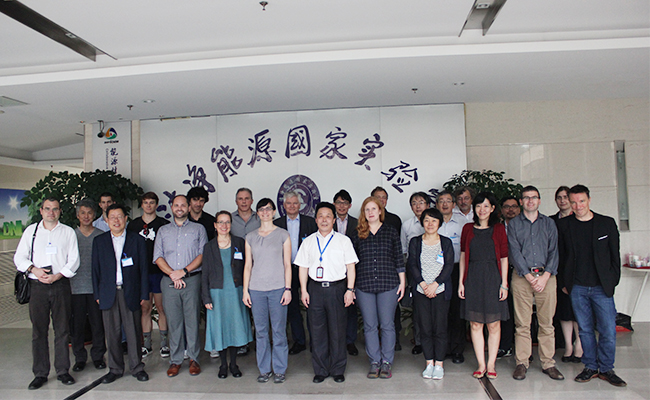The 7th Chemical Sciences and Society Summit (CS3)was held in Dalian on September 6th to 8th, 2017, which was organized by the Chemical Society of China, the United States, Germany, Britain, Japan and National Natural Science Foundation of China. 2017 CS3 was focusing “Solar Energy & Photonics for a Sustainable Future”, and covering the four sub-topics: Artificial Photosynthesis and CO2 Reduction; New PV Materials with Abundant Elements; Photonic Materials and Photon Upconversion and Photofunctional Materials and Structures for Light Manipulation.
Prof. LI Can from the Dalian Institute of Chemical Physics, Chinese Academy of Sciences was the head of Chinese delegation and the scientific chair of this summit. During the three days meeting, 40 experts from China, Germany, Japan, the UK and the USA came together and discussed the issues of the sustainable future of solar energy and photonics. The results of the discussion will be condensed and summarized into a white paper.
On the 8th September, CS3 participants visited Dalian Institute of Chemical Physics, vice director Prof. JIN Yuqi met the visitors and gave the brief introduction of DICP. Then participants visited Energy Storage Division, Fuel Cell & Battery Division, Solar Energy Division and Nano and Interfacial Catalysis Group.
The CS3 initiative is a collaboration between the Chinese Chemical Society (CCS), the German Chemical Society (GDCh), the Chemical Society of Japan (CSJ), the Royal Society of Chemistry (RSC), and the American Chemical Society (ACS). The symposia series is supported by the National Science Foundation of China (NSFC), the German Research Foundation (DFG), the Japan Science and Technology Agency (JST), the UK Engineering and Physical Sciences Research Council (EPSRC), and the U.S. National Science Foundation (NSF). CS3 brings together some of the best minds in chemical research from around the world and challenges them to propose innovative solutions to society’s most pressing needs in health, food, energy, and the environment. This unique gathering boasts an innovative format, aiming to set the course of international science, and rotates among participating nations.
China is the one of initiators of CS3, and is the only representative of the developing countries, which is the proof of the improvement of the international status of basic research in chemistry of China. Taking part in this summit can help China enhance the international status in chemistry; promotes China’s young chemical scientists to enter into the research frontier; reflects Chinese’s responsibility as the super country.
Solar energy research team, led by Prof. LI Can, focuses the research on solar energy photocatalysis, photocatalytic decomposition of hydrogen in water and reduction of carbon dioxide. Over the past decade, the research team has made significant progress in the field of cutting-edge scientific research: with the strategy of dual co-catalysts loaded on semiconductor, the photocatalytic hydrogen production quantum efficient can reach up to 93%, which is the highest record in the world; new conception of phase junction promoting charge separation and photocatalytic performance was proposed; new phenomenon of charge separation between the different facets of semiconductor crystal was found; with the new conception and strategy of fabrication“hole-storage layer”on the photoelectrochemical electrode for water splitting, theoretical photocurrent limit under sunlight was approached. Based on these advances on fundamental understandings, the solar to hydrogen (STH) efficiencies in many photocatalysis systems were significantly improved. To achieve a deep understanding on the fundamentals in this field, home-made scanning photoelectric imaging method was developed and provided new opportunities to directly visualize photogenerated charge separation and understand the driving force in photocatalyst on nano/micro meter scale.
These basic scientific work has promoted the research level of solar energy photocatalysis and photoelectric catalysis in DICP and even in China, and has an important influence in the field of solar energy artificial light synthesis around the world. (Text and Photo by LIU Jiajia)
